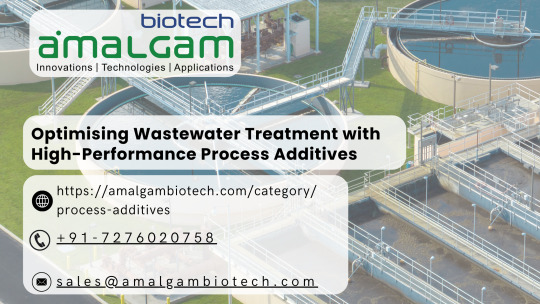Don't wanna be here? Send us removal request.
Text

What Is a Bioculture and Why Is It Important?
Bioculture refers to a scientifically selected consortium of beneficial microorganisms that digest organic waste in sewage or effluent. These microorganisms are specially cultivated to perform optimally in aerobic or anaerobic environments and are essential in Sewage Treatment Plants (STPs) and Effluent Treatment Plants (ETPs).
A professional bioculture manufacturer provides microbial blends that target specific contaminants—grease, oils, ammonia, hydrogen sulphide, and suspended solids—ensuring efficient breakdown and reduced sludge formation.
#bioculture for etp#bio culture for etp#odour control spray#bioculture manufacturer#bio culture for wastewater treatment#bioculture for stp#bio culture for stp
0 notes
Text
Bioculture refers to a scientifically selected consortium of beneficial microorganisms that digest organic waste in sewage or effluent. These microorganisms are specially cultivated to perform optimally in aerobic or anaerobic environments and are essential in Sewage Treatment Plants (STPs) and Effluent Treatment Plants (ETPs).
A professional bioculture manufacturer provides microbial blends that target specific contaminants—grease, oils, ammonia, hydrogen sulphide, and suspended solids—ensuring efficient breakdown and reduced sludge formation.
0 notes
Text

Wastewater treatment is an essential process that safeguards public health and the environment. However, one of the most persistent challenges faced by treatment facilities is the control of unpleasant odours. These foul smells, often resulting from the breakdown of organic matter, can cause significant discomfort to nearby communities and treatment plant workers. Effective odour control in wastewater treatment is not just about improving air quality—it’s about maintaining compliance with environmental regulations, ensuring operational efficiency, and fostering a healthier ecosystem.
#bio culture for etp#bioculture for etp#bioculture for stp#odour control spray#watertreatment#wastewater odor control chemicals
0 notes
Text
Bioculture is a concentrated mix of beneficial microorganisms designed to enhance the biological treatment process in wastewater systems like Effluent Treatment Plants (ETP) and Sewage Treatment Plants (STP). Using bio culture for ETP and bio culture for STP improves the breakdown of organic waste, reduces sludge volume, and eliminates foul odours. Whether you’re treating industrial wastewater or municipal sewage, bio culture for wastewater treatment supports faster degradation and improved compliance with discharge norms. Trusted bioculture manufacturers offer custom formulations tailored to different waste loads, ensuring consistent performance and environmental safety. Adopting bioculture for ETP and bioculture for STP is a smart, sustainable choice for industries aiming to meet pollution control standards effectively.
0 notes
Text

Odour control in wastewater treatment is essential to maintaining public health, environmental standards, and workplace safety. A well-designed odor control system for wastewater helps eliminate foul smells caused by hydrogen sulfide and other volatile compounds. These systems often use chemical scrubbers, biofilters, or odour control sprays to neutralize unpleasant gases. One common source of odour and operational issues is the buildup of fats, oils, and grease, making oil and grease removal from wastewater a crucial step in treatment processes. Efficient removal and odour management not only improve air quality but also enhance the performance of wastewater infrastructure.
#bioculture for etp#watertreatment#odour control spray#bio culture for wastewater treatment#bioculture manufacturer#wastewater odor control chemicals
0 notes
Text
Odour control in wastewater treatment is essential to maintaining public health, environmental standards, and workplace safety. A well-designed odor control system for wastewater helps eliminate foul smells caused by hydrogen sulfide and other volatile compounds. These systems often use chemical scrubbers, biofilters, or odour control sprays to neutralize unpleasant gases. One common source of odour and operational issues is the buildup of fats, oils, and grease, making oil and grease removal from wastewater a crucial step in treatment processes. Efficient removal and odour management not only improve air quality but also enhance the performance of wastewater infrastructure.
0 notes
Text

chemical for sewage treatment plant chemical oxidation in wastewater treatment chemicals used for wastewater treatment
0 notes
Text
At Amalgam Biotech, advanced chemicals used for wastewater treatment are engineered to improve the performance and reliability of sewage and effluent treatment systems. These process additives include a wide range of chemical solutions such as coagulants, flocculants, pH adjusters, and oxidation agents tailored to enhance solid-liquid separation, pollutant breakdown, and odour control. One of the most effective techniques offered is chemical oxidation in wastewater treatment, which targets stubborn organic
#watertreatment#chemical for sewage treatment plant#chemical oxidation in wastewater treatment#chemicals used for wastewater treatment
0 notes
Text
Amalgam Biotech is a trusted name in delivering high-performance waste water treatment chemicals and wastewater management solutions designed to optimise treatment efficiency and eliminate unpleasant odours. Their eco-friendly range of wastewater odor control chemicals targets foul gases like hydrogen sulphide and ammonia at the molecular level, ensuring a cleaner and safer environment. From water treatment chemicals to specialised water treatment plant chemicals used across industries, Amalgam Biotech’s scientifically developed solutions help improve effluent quality and comply with regulatory standards. Whether you're managing an STP, ETP, or large-scale facility, their wastewater treatment solutions are built to perform reliably and sustainably.
#bioculture for etp#odour control spray#bio culture for wastewater treatment#bioculture for stp#bio culture for etp#bioculture manufacturer
0 notes
Text
Bio culture for ETP (Effluent Treatment Plant) and STP (Sewage Treatment Plant) is an essential solution for improving the efficiency and effectiveness of wastewater treatment systems. These microbial formulations, also known as bioculture for ETP and bioculture for STP, contain beneficial bacteria that accelerate the breakdown of organic matter, reduce sludge generation, eliminate foul odours, and enhance the overall treatment process. Widely used in both industrial and domestic setups, bio culture for wastewater treatment ensures compliance with environmental norms and contributes to sustainable water management. Choosing the right bioculture manufacturer is crucial for achieving optimal results, as high-quality bioculture contains robust microbial strains tailored to specific wastewater conditions.
#bioculture for etp#bio culture for etp#bioculture for stp#bio culture for stp#bio culture for wastewater treatment#bioculture manufacturer
0 notes
Text

Enhancing Wastewater Treatment with Effective Bio Culture Solutions
Bio culture for ETP (Effluent Treatment Plant) and STP (Sewage Treatment Plant) is an essential solution for improving the efficiency and effectiveness of wastewater treatment systems. These microbial formulations, also known as bioculture for ETP and bioculture for STP, contain beneficial bacteria that accelerate the breakdown of organic matter, reduce sludge generation, eliminate foul odours, and enhance the overall treatment process. Widely used in both industrial and domestic setups, bio culture for wastewater treatment ensures compliance with environmental norms and contributes to sustainable water management. Choosing the right bioculture manufacturer is crucial for achieving optimal results, as high-quality bioculture contains robust microbial strains tailored to specific wastewater conditions.
FAQs:
What is bio culture for ETP and how does it work? Bio culture for ETP is a microbial solution that helps degrade industrial pollutants, improving the quality of treated effluent.
How is bio culture for STP different from ETP bio culture? STP bio culture is designed for domestic sewage, focusing on organic waste, while ETP bio culture targets industrial contaminants.
Can I use bio culture for all wastewater treatment systems? Yes, bio culture is suitable for various treatment systems, including ETPs, STPs, and other wastewater setups.
What are the key benefits of using bioculture in wastewater treatment? It enhances biodegradation, reduces sludge, controls odour, and improves overall plant efficiency.
How do I find the best bioculture manufacturer? Look for a manufacturer with a proven track record, quality-certified products, and technical support for ETP and STP applications.
#bioculture for stp#bioculture for etp#bio culture for etp#bio culture for wastewater treatment#bio culture for stp#bioculture manufacturer
0 notes
Text
Bio culture for ETP (Effluent Treatment Plant) and STP (Sewage Treatment Plant) is an essential solution for improving the efficiency and effectiveness of wastewater treatment systems. These microbial formulations, also known as bioculture for ETP and bioculture for STP, contain beneficial bacteria that accelerate the breakdown of organic matter, reduce sludge generation, eliminate foul odours, and enhance the overall treatment process. Widely used in both industrial and domestic setups, bio culture for wastewater treatment ensures compliance with environmental norms and contributes to sustainable water management. Choosing the right bioculture manufacturer is crucial for achieving optimal results, as high-quality bioculture contains robust microbial strains tailored to specific wastewater conditions.
#bioculture for etp#bio culture for etp#bio culture for wastewater treatment#bioculture for stp#bio culture for stp#bioculture manufacturer
0 notes
Text

Bio culture for ETP (Effluent Treatment Plant) and STP (Sewage Treatment Plant) plays a pivotal role in enhancing the biological treatment of wastewater. These bio cultures, also referred to as bioculture for ETP and bioculture for STP, consist of selected strains of microorganisms specifically formulated to break down organic pollutants, reduce sludge volume, and control odour. Used widely in industrial and municipal applications, bio culture for wastewater treatment accelerates the degradation process, improves BOD/COD reduction, and boosts overall system efficiency. Regular dosing of bio culture ensures a healthy microbial population, leading to consistent and environmentally safe wastewater discharge.
Frequently Asked Questions (FAQs)
1. What is bio culture for ETP and how does it work? Bio culture for ETP consists of beneficial microorganisms that help degrade organic waste in effluent water, improving the efficiency of the treatment plant.
2. Can bio culture be used in both ETP and STP systems? Yes, bio cultures are suitable for both ETP and STP, where they support the breakdown of contaminants in industrial and domestic sewage, respectively.
3. What are the benefits of using bioculture in wastewater treatment? Benefits include faster degradation of pollutants, improved BOD/COD levels, odour control, reduced sludge production, and cost-effective operation.
4. How often should bio culture be dosed in STP or ETP systems? Dosing frequency depends on plant load and design, but typically it is done daily or as per the recommendation of the bio culture supplier.
#bioculture for etp#bio culture for etp#bioculture for stp#bio culture for wastewater treatment#watertreatment
0 notes
Text
Bio culture for ETP (Effluent Treatment Plant) and STP (Sewage Treatment Plant) plays a pivotal role in enhancing the biological treatment of wastewater. These bio cultures, also referred to as bioculture for ETP and bioculture for STP, consist of selected strains of microorganisms specifically formulated to break down organic pollutants, reduce sludge volume, and control odour. Used widely in industrial and municipal applications, bio culture for wastewater treatment accelerates the degradation process, improves BOD/COD reduction, and boosts overall system efficiency. Regular dosing of bio culture ensures a healthy microbial population, leading to consistent and environmentally safe wastewater discharge.
Frequently Asked Questions (FAQs)
1. What is bio culture for ETP and how does it work? Bio culture for ETP consists of beneficial microorganisms that help degrade organic waste in effluent water, improving the efficiency of the treatment plant.
2. Can bio culture be used in both ETP and STP systems? Yes, bio cultures are suitable for both ETP and STP, where they support the breakdown of contaminants in industrial and domestic sewage, respectively.
3. What are the benefits of using bioculture in wastewater treatment? Benefits include faster degradation of pollutants, improved BOD/COD levels, odour control, reduced sludge production, and cost-effective operation.
4. How often should bio culture be dosed in STP or ETP systems? Dosing frequency depends on plant load and design, but typically it is done daily or as per the recommendation of the bio culture supplier.
5. Is bio culture environmentally friendly and safe to use? Yes, bio cultures are eco-friendly and composed of non-pathogenic bacteria, making them safe for the environment and human health.
#odour control spray#bioculture for etp#bio culture for etp#bioculture for stp#chemicals used for wastewater treatment
0 notes
Text

Managing unpleasant smells and harmful gases from wastewater treatment plants is crucial for maintaining environmental and operational standards. An efficient odor control system for wastewater not only eliminates foul odours but also ensures a healthier working environment. Modern odour control in wastewater treatment involves advanced odour control sprays, bio-enzymatic solutions, and targeted wastewater odor control chemicals. These are a key part of comprehensive wastewater management solutions, helping facilities meet compliance standards while reducing their environmental footprint. The integration of effective waste water treatment chemicals ensures cleaner effluent, improved air quality, and enhanced plant performance.
Frequently Asked Questions (FAQs):
1. What is an odor control system for wastewater? An odor control system in wastewater treatment is designed to neutralize or eliminate foul gases such as hydrogen sulfide, ammonia, and other volatile organic compounds using biological, chemical, or mechanical methods.
2. How do odour control sprays work in wastewater treatment? Odour control sprays use fine mists of neutralising agents or bio-enzymes that bond with or break down odorous molecules, making them harmless and removing unpleasant smells from the air.
3. What types of chemicals are used for wastewater odor control? Common chemicals include oxidising agents, bio-enzymes, activated carbon, and chlorine dioxide. These are formulated to treat specific odour-causing compounds in wastewater systems.
#odour control spray#waste water treatment chemicals#wastewater management solutions#wastewater odor control chemicals#wastewater treatment solutions#water treatment chemicals#water treatment plant chemicals used
0 notes
Text
Managing unpleasant smells and harmful gases from wastewater treatment plants is crucial for maintaining environmental and operational standards. An efficient odor control system for wastewater not only eliminates foul odours but also ensures a healthier working environment. Modern odour control in wastewater treatment involves advanced odour control sprays, bio-enzymatic solutions, and targeted wastewater odor control chemicals. These are a key part of comprehensive wastewater management solutions, helping facilities meet compliance standards while reducing their environmental footprint. The integration of effective waste water treatment chemicals ensures cleaner effluent, improved air quality, and enhanced plant performance.
Frequently Asked Questions (FAQs):
1. What is an odor control system for wastewater? An odor control system in wastewater treatment is designed to neutralize or eliminate foul gases such as hydrogen sulfide, ammonia, and other volatile organic compounds using biological, chemical, or mechanical methods.
2. How do odour control sprays work in wastewater treatment? Odour control sprays use fine mists of neutralising agents or bio-enzymes that bond with or break down odorous molecules, making them harmless and removing unpleasant smells from the air.
3. What types of chemicals are used for wastewater odor control? Common chemicals include oxidising agents, bio-enzymes, activated carbon, and chlorine dioxide. These are formulated to treat specific odour-causing compounds in wastewater systems.
4. Why is odour control important in wastewater management? Odour control is essential to protect worker health, ensure community satisfaction, prevent environmental pollution, and comply with local environmental regulations.
5. What are the best solutions for comprehensive wastewater management? Effective wastewater management combines biological treatments, chemical dosing (like waste water treatment chemicals), mechanical filtration, and smart odour control systems for efficient, eco-friendly operations.
0 notes
Text

Bio culture and bioculture for ETP (Effluent Treatment Plant) and STP (Sewage Treatment Plant) are essential microbial formulations used in wastewater treatment to break down organic waste, reduce sludge volume, and eliminate foul odours. Whether you're treating industrial effluents or domestic sewage, bio culture for wastewater treatment offers an eco-friendly and cost-effective solution. These microbial cultures are specially developed to accelerate the degradation process, improving plant efficiency and ensuring compliance with environmental standards.
FAQs:
What is bio culture for ETP? Bio culture for ETP is a microbial solution used in effluent treatment plants to break down organic matter, reduce sludge, and control odour.
What is the difference between bio culture and bioculture for STP? There is no technical difference; both terms refer to microbial blends used in sewage treatment plants to enhance biological breakdown of waste.
How does bio culture help in wastewater treatment? Bio culture introduces beneficial bacteria that accelerate the decomposition of organic pollutants, making the treatment process faster and more efficient.
0 notes